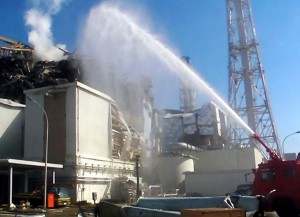Crisis Lessons That Go Unlearned
Posted on June 8, 2011
Filed Under Business, Government, Technology | Leave a Comment
 Michael Coston has eclectic interests, so on his Avian Flu Diary he writes about the continuing mishandling of the communication aspects of Japan’s Fukushima nuclear plant accident. “When, oh when, will they ever learn?” one is prompted to ask. The question seems to hold both for the Tokyo Electric Power Co. (TEPCO), the plant’s operator, and Japan’s Nuclear and Industrial Safety Agency (NISA).
Michael Coston has eclectic interests, so on his Avian Flu Diary he writes about the continuing mishandling of the communication aspects of Japan’s Fukushima nuclear plant accident. “When, oh when, will they ever learn?” one is prompted to ask. The question seems to hold both for the Tokyo Electric Power Co. (TEPCO), the plant’s operator, and Japan’s Nuclear and Industrial Safety Agency (NISA).
The earthquake-initiated accident was much worse than first reported, with three of the six reactors on the Fukushima Daiichi site experiencing meltdowns, and two of them possibly being melt throughs, with nuclear fuel actually “melted through the walls or floors of (the) reactor vessel.”
Yet the accident’s severity “was held at a 5 for a full month (the same as Three Mile Island), before being raised to a Chernobyl-comparable level 7 on April 11th,” Coston notes.
The amount of radiation released from the site has now been more than doubled from initial estimates and environmental contamination around the plant is likely worse than feared.
“These belated and incrementally worsening status reports from plant operator TEPCO and Japan’s Nuclear Safety Commission,” Coston adds, “probably won’t do a lot to inspire confidence in their future pronouncements.”
Precisely. Credibility was an early casualty at Fukushima and, like the announced condition of the site, its standing continues to worsen. Who would want to forego such a vital aspect of reputation and reliability? Yet, within without effective crisis communication disciplines in place from the start, it’s so easy for credibility to slip away.
We need to acknowledge the “stoic and understated nature” of the Japanese response to the crisis as a distinguishing aspect of the country’s national character; Japan isn’t the U.S. And heroic actions continue to be taken in efforts to secure the stricken plants. That’s true enough, a reality of the Fukushima setting.
Yet good crisis communication is a kind of habit. It needs to be practiced persistently, or credibility will wane. Even stoic people can come to feel ill-served. “Playing catch-up, or worse, appearing to intentionally withhold bad news,” Coston notes, “can make a bad situation worse.”
Another kind of reality is that one of the most basic crisis skills, candor, the means of “getting out in front of any crisis,” is very difficult to instill in bureaucracies.
“Telling the truth and telling it early, are key points to effective crisis communications,” Coston notes. “Simple advice, yet it is often ignored.” We’d make that good advice, simple is another matter.
Training, drilling and critiquing that produce instilled professionalism are required to produce candor in a corporate crisis. Even more basic, though, leadership needs to recognize that that’s what it takes.
That’s usually where awareness is most sadly lacking – at the top, early on, before a crisis strikes. Virtually by definition, crises are usually unexpected events. That makes awareness and prior engagement of the root defensive realities the essential starting points for effective crisis response.
This has been known, it seems, for eons now, or at least since the 1979 accident at Three Mile Island Unit 2. Yet corporate credibility crises keep occurring. “When, oh when, will they ever learn?” – Doug Bedell
Comments
Leave a Comment
If you would like to make a comment, please fill out the form below.
Recently
- Presentations With Forethought
- Technical Writing’s Lineage – Surely It’s Deeper than Digital
- At the Holidays, Twitting Amazon
- Successful Cookie Baking – From Mom, an Acknowledged Expert
- Slides for a Tech Writer’s Craft
- Digital or Not, Be Clear
- Being Watchful About Digital Designs…
- When Proposals Don’t Click, Keep Making Them Anyway
- Like a Good Gardener, Help an Enterprise Keep Itself Current
- We’re Leaders All, And Need to Think That Way
Categories
Archives
- January 2017
- December 2016
- November 2016
- October 2016
- September 2016
- August 2016
- July 2016
- June 2016
- May 2016
- April 2016
- March 2016
- February 2016
- January 2016
- December 2015
- November 2015
- October 2015
- September 2015
- August 2015
- July 2015
- June 2015
- May 2015
- April 2015
- March 2015
- February 2015
- January 2015
- December 2014
- November 2014
- October 2014
- March 2014
- February 2014
- January 2014
- December 2013
- November 2013
- October 2013
- September 2013
- August 2013
- July 2013
- June 2013
- May 2013
- April 2013
- March 2013
- February 2013
- January 2013
- December 2012
- November 2012
- October 2012
- September 2012
- August 2012
- July 2012
- June 2012
- May 2012
- April 2012
- March 2012
- February 2012
- January 2012
- December 2011
- November 2011
- October 2011
- September 2011
- August 2011
- July 2011
- June 2011
- May 2011
- April 2011
- March 2011
- February 2011
- January 2011
- December 2010
- November 2010
- October 2010
- September 2010
- August 2010
- July 2010
- June 2010
- May 2010
- April 2010
- March 2010
- February 2010
- January 2010
Blogroll